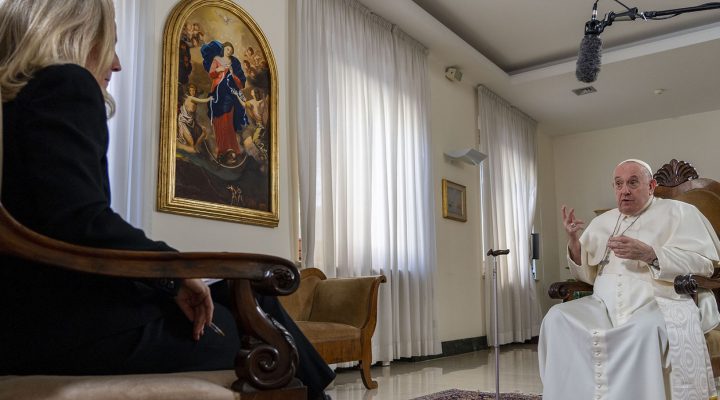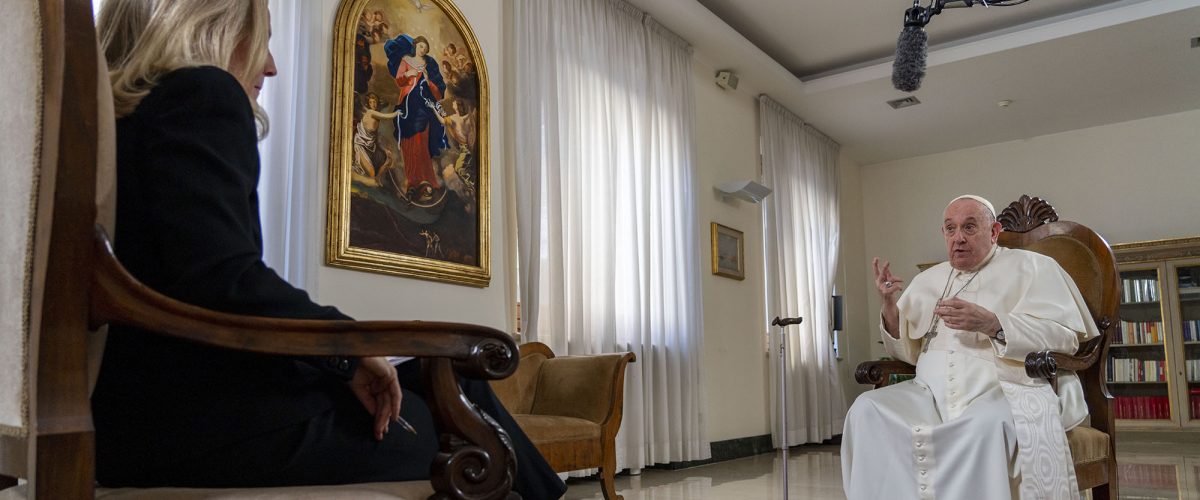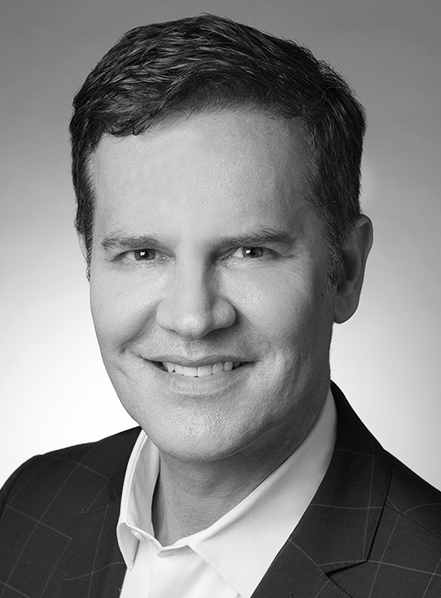What did Pope Francis actually say about homosexuality last week? And what did he mean by what he said?
On the surface, the pontiff condemned laws that criminalize homosexuality, urging Catholic bishops who support these laws to be more welcoming to the LGBTQ community and to understand homosexuality as a sin akin to lacking in charity toward others.
That sent shockwaves across Catholic communities, provoking listeners to more carefully consider the ways in which they distinguish and use the words “sin” and “crime.”
The comments were made during a Jan. 24 interview with the Associated Press. Although the interview originated in Spanish, AP offered English subtitles on the video clips, as well as a full English transcript of the interview.
“Being homosexual is not a crime.”
According to that AP translation, the pope said: “We are all children of God, and God loves us as we are and for the strength that each one of us has to fight for our dignity. Being homosexual is not a crime. It’s not a crime. ‘Yes, but it’s a sin.’ Well, yes, but let’s make the distinction first between sin and crime. But it’s also a sin to lack charity with one another, so what about that?”
Next, the video cuts to a new clip and continues:
“Every man and every woman must have a window in their life where they can turn their hope and where they can see the dignity of God. And being homosexual isn’t a crime, it’s a human condition.”
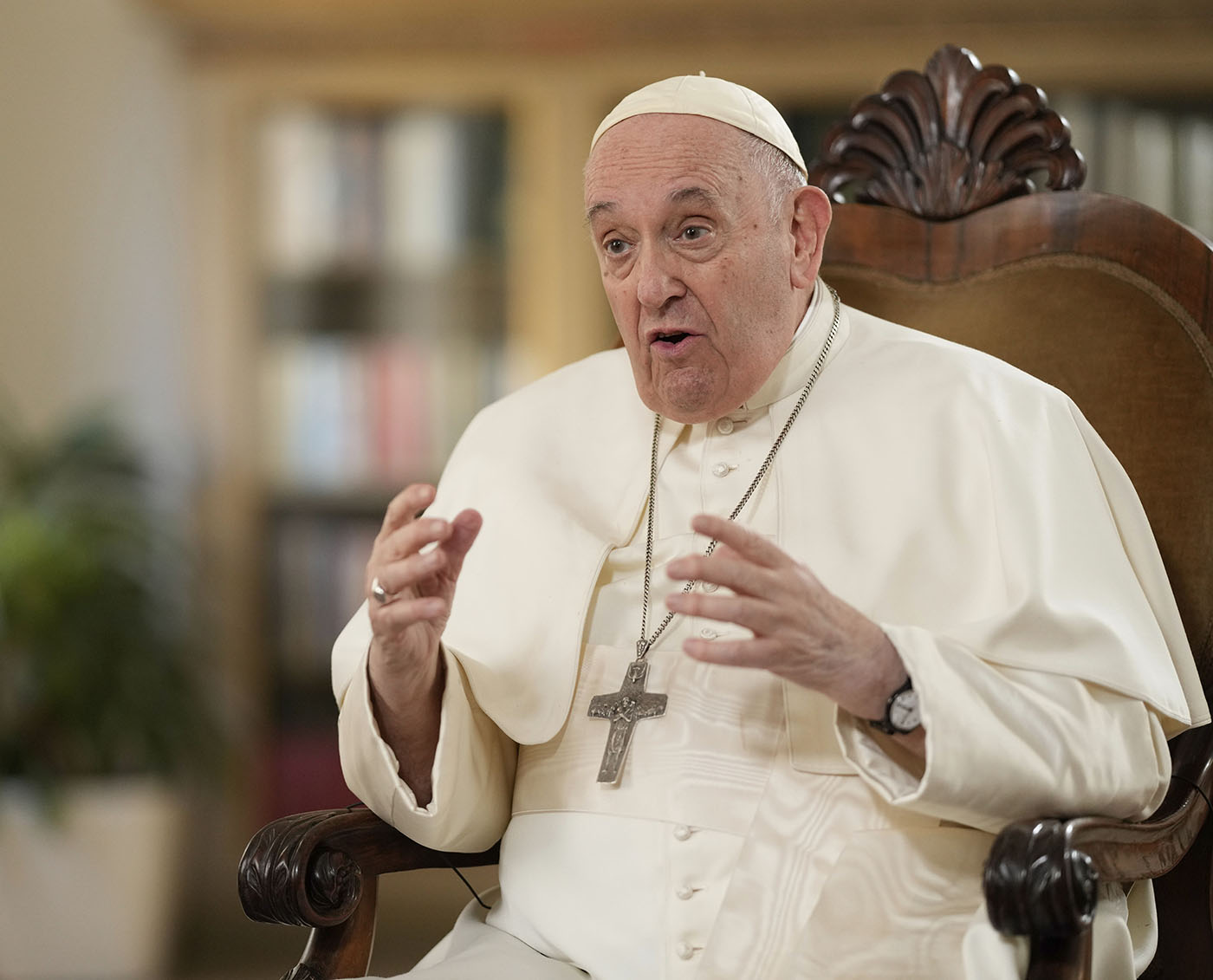
Pope Francis pauses during an interview with The Associated Press at The Vatican, Tuesday, Jan. 24, 2023. (AP Photo/Andrew Medichini)
The interview incited arguments on social media as English-speaking listeners attempted to interpret what the pope meant when he said, “It’s not a crime. ‘Yes, but it’s a sin.’ Well, yes, but … .”
Clearly the pope believes homosexuality should be decriminalized worldwide and that all LGBTQ people are children of God. But was he telling listeners that being gay is a sin, or was he making a roundabout attempt at pushing back against mainstream Catholic beliefs on sexual behavior?
Initial Catholic perspectives
It appears the pope says being gay, although not a crime, is still a sin. That would explain why he gives an example of another sin, lacking charity, as an immediate comparison.
Listeners adhering to this translation may also go a step further, saying that although he acknowledged homosexuality as a sin, this comparison was meant to express how much more important it is that the church show charity to the LGBTQ community, because the sin of lacking charity is worse.
This is difficult to understand since this statement is placed in between remarks that seem to affirm the LGBTQ community.
He calls upon bishops to minister to gay people and says he feels strongly that homosexuality should not be a crime. And at the end of the quote when he calls it a “human condition,” it seems he is professing a view that homosexuality is just another way in which children of God are created.
But there is just enough space here for listeners to be confused.
Juan Carlos Cruz, an openly gay adviser to the Vatican and member of the Pontifical Commission for the Protection of Minors, told NPR the Catholic church’s insistence that homosexuality is a sin is “shameful,” yet he is still happy about the pope’s remarks. As someone who knows him personally, Cruz has seen firsthand Pope Francis’ efforts to correct himself when he is wrong, and he believes this statement is proof the pope is trying to become more supportive of the LGBTQ community.
Thus, although Francis did not completely stand against the notion that homosexuality is sinful, he did make a point that the church should start becoming more inclusive, which many Catholics believe will spark progress in the long run.
“He actually did not say being homosexual is a sin.”
Jesuit Priest James Martin, in a separate interview with NPR, made this correction: “He actually did not say being homosexual is a sin. That kind of clip was his sort of imagining a conversation between two people. But the focus of his comments was on the decriminalization of homosexuality, which really is historical.”
Martin clarified that in Catholic teaching, it is not a sin to be gay. It is homosexual acts that are considered sinful. Pope Francis has stated these things before, so he is not contradicting previous statements, nor is he challenging any church teaching in the interview, Martin said.
Martin said the pope was, however, changing the tone of the conversation on LGBTQ rights, potentially leading Catholic bishops to be “converted to tenderness toward LGBTQ people.” Martin thinks the pope is telling listeners that, even if they believe homosexuality is a sin, singling out the LGBTQ person is “targeting behavior,” which is wrong.
Mistranslations?
Others are digging deeper into what Francis said with their own translations.
The New York Times offered a slightly altered translation of the pope’s words: “It’s not a crime. ‘Yes, but it’s a sin.’ First, let’s distinguish sin from crime. But it is also a sin to lack charity with one another.”
Twitter users also joined the conversation, offering their own translations of the pope’s remarks.
James Alison, a Catholic priest who lives in Madrid and is fluent in both Spanish and English, said it is clear the pope was talking as if he is an “imagined objector” when saying homosexuality is a sin. “He then says to his imaginary objector “OK, let’s distinguish between sin and crime — it’s also a sin to lack charity toward someone else, so how are you doing on that score?”
Jason Katz, who also commented on the AP’s YouTube video of the interview, made a further correction in response to Alison’s translation. He said, “The pope doesn’t even say ‘OK’ to the comment.” According to Katz, the pope says, “’Si, pero es pecado.’ Primero, distingamos pecado por delito.” In English, that is, “’Yes, but it is sin.’ First, let’s distinguish between a crime and a sin.”
All these translations omit an important phrase the AP translation includes: “Well, yes.”
Including that phrase implies the pope agrees with the imagined objector who argues homosexuality is a sin. However, without the phrase, the pope could have been teaching a nuanced lesson.
Without that phrase, Francis is challenging the imagined objector to do two things.
First, to differentiate between crime and sin, which is important in his overarching point about decriminalizing homosexuality. The goal of this conversation was to tell listeners that gay people should not be legally punished for their sexuality, and he does not want Catholic listeners to utilize the notion of “sin” as an excuse to promote laws that do.
If being gay is a natural human condition, then it should be judged differently from actions that are chosen.
Second, he is asking the objector to compare homosexuality to other sins they recognize. If being gay is a natural human condition, then it should be judged differently from actions that are chosen.
Although he does not explicitly say homosexual behavior is not a sin, he makes a clear distinction between what kind of behaviors listeners should be focusing on. If his objectors want to talk about homosexuality as an inherent sin, they must first consider a bigger issue: What sins are they committing in their refusal to have charity toward the LGBTQ community?
This discussion on how the pope’s words should be correctly interpreted brings to light the root of a larger issue: Why, although he was willing to publicly denounce the criminalization of homosexuality, did he refrain from directly stating his feelings about homosexuality and sin?
The answer? Catholic church doctrine.
Catholic moral teaching
After the controversy created by the interview, James Martin, who runs an outreach ministry for LGBTQ Catholics, sent Francis a letter Jan. 27 asking him to clarify his statement. The pope responded within a day.
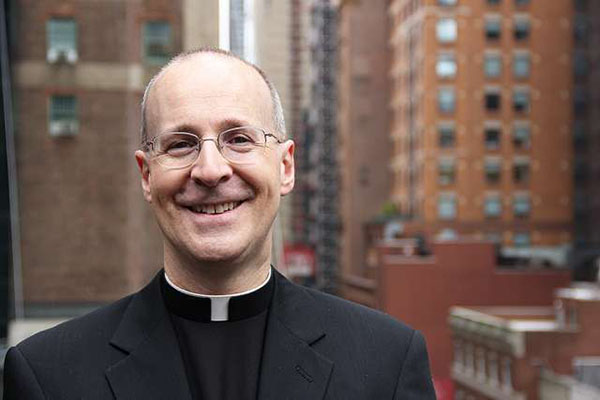
James Martin
He told Martin that when he called homosexuality a sin, he was not exclusively talking about LGBTQ persons, but about people in general. He “was simply referring to Catholic moral teaching, which says that every sexual act outside of marriage is a sin.”
Francis went on to say that circumstance is important in discerning morality, as it may “decrease or eliminate fault.” He said, “Catholic morality not only takes into consideration the matter, but also evaluates freedom and intention.”
He then emphasized once again that homosexuality is not a crime. He also acknowledged that because of the televised nature of his interview, his conversation may have been confusing for listeners to understand.
But is this a true clarification?
“His explanation … pushes the issue away from the direct matter of LGBTQ behavior and toward Catholic doctrines that dictate when and how sexual relationships should happen.”
His explanation in this letter to Martin pushes the issue away from the direct matter of LGBTQ behavior and toward Catholic doctrines that dictate when and how sexual relationships should happen. At no point in the clarification does the pope say same-sex relations are not a sin, but he does blur the lines a bit.
He first affirms that, in general, premarital sex is sinful for all people. Then, he explains how morality must consider freedom and intention. Actions are not designated as moral simply because they do not hold the label of “sin,” and the opposite should also be true. But he leaves the door open for interpretation as to what this means for the LGBTQ community.
Is homosexual behavior only sinful if it is carried out prior to marriage, and not after, because they have loving intentions within their relationships, or is all homosexual behavior sinful?
A deeper discussion of Catholic marriage doctrines confuses the issue further.
Pope Francis has said publicly that he supports the legalization of same-sex civil unions, despite his predecessors disagreeing. In fact, the church under Pope John Paul II issued a document stating that marriage was “established by the Creator with its own nature” and should only be between a man and a woman, denouncing support of same-sex civil unions in 2003.
However, in 2021, Francis reaffirmed church teachings asserting the Catholic church “does not have, and cannot have, the power to bless unions of persons of the same sex.”
The document acknowledges the faith of “those who manifest a homosexual orientation” and rejects “unjust discrimination,” while still emphasizing the importance of sacramentals. It also explains that although there may be positive elements within a same-sex relationship, the union of a same-sex couple cannot be blessed by the church because it is “not ordered to the Creator’s plan.”
A nuanced approach
What Pope Francis said, then, is something much more nuanced.
According to Catholic doctrine, being gay is not a sin because some people are born with a homosexual orientation that is not chosen. However, the Catholic Church also asserts that marriage is an institution reserved for one man and one woman, and because the Creator established it as such, this cannot be changed by any pope, church official or modern understanding of sexuality.
So, if Pope Francis wants to support LGBTQ communities while also maintaining his belief in Catholic Church doctrine, he must take the middle ground and assert that the church cannot bless same-sex marriages but can support same-sex civil unions outside the church’s authority.
The issue, then, is not the morality of same-sex relationships, it is the inability of Catholic priests to bless a union that does not align with their Creator’s definition of marriage as outlined in Catholic teachings.
This is also, likely, why Pope Francis is dancing around full affirmation of same-sex relations.
If he affirms homosexual behavior, then his affirmation contradicts his Catholic belief of what the union of marriage should look like. And because the Catholic church asserts this teaching cannot be changed, he cannot be fully affirming without rejecting the theological stance of the church.
Mallory Challis is a senior at Wingate University and serves this year as BNG’s Clemons Fellow.
Related articles:
Pope Francis practices Orwellian doublethink | Opinion by Russ Dean

